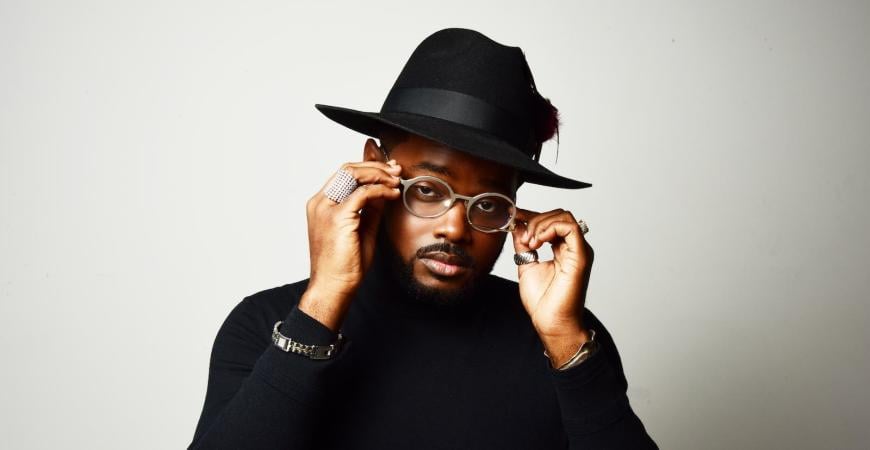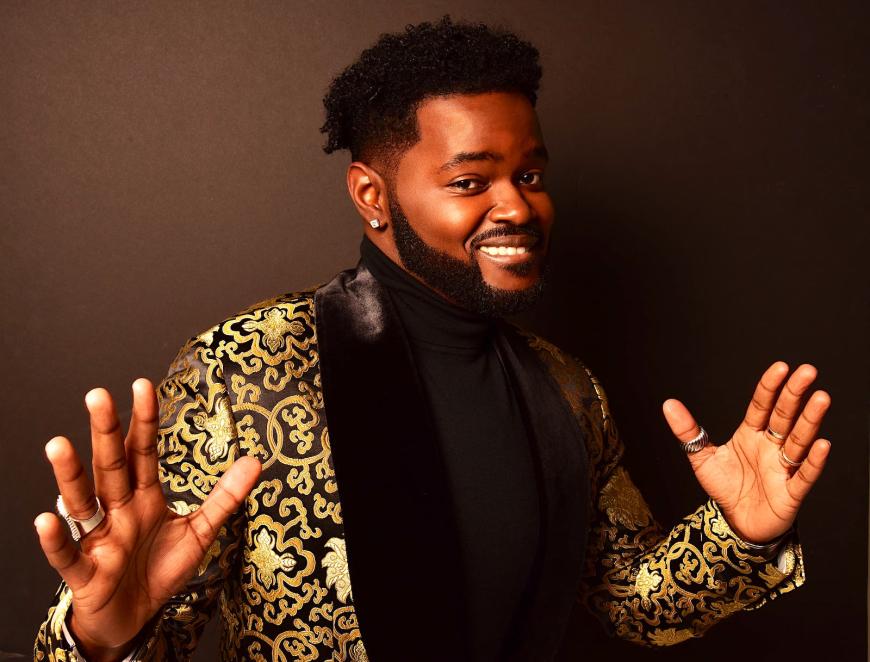
Many careers took interesting turns due to a pandemic pivot, but perhaps none more so than that of John Holiday. An operatic countertenor from Rosenberg, Texas, Holiday grew up singing in church, where his grandmother was pianist, and with the Fort Bend Boys Choir. After attending Southern Methodist University, earning a master’s at Cincinnati Conservatory, and an artist’s diploma at Juilliard, the singer was on track for a major operatic career. In 2014 he won a study grant from the Richard Tucker Foundation, third place in the prestigious Operalia competition, and was named newcomer of the year by Opernwelt. In 2017 he received the Marian Anderson Vocal Award.
Holiday had been approached by producers of NBC’s The Voice, but he was loathe to give up a career for what might well be a flash in the pan. But with the sudden pandemic cancellation of almost all of his work, the math changed and he went for it. Fans of The Voice will remember his stratospheric covers of Beyoncé and Celine Dion, the two-piano rendition of “Bridge Over Troubled Water” with his coach, John Legend, and his flashy outfits, always topped with signature hat and glasses. In the course of the show, Holiday also fell in love. He and fellow-contestant, singer-songwriter Rio Souma, will be married this summer in Houston.
Holiday made it to the finals of the show and came in fifth, and since then has debuted a pop single, performed an all-Gershwin program at the Hollywood Bowl with the Los Angeles Philharmonic, and accompanied himself on the piano for an innovative cinematic telling of Schumann’s Dichterliebe (A poet’s love). But most notably, he has merged back into the operatic fast lane, including performances at the Metropolitan Opera, Utah Opera, and Dallas Opera.
Holiday will brighten the Bay Area stage this month in Opera Parallèle’s “Over the Rainbow,” a night of song that promises to be a combination of classical and popular styles. Other upcoming engagements include a return to the Met and a debut with the Bayerische Staatsoper, all of which Holiday works around his teaching schedule at Lawrence University Conservatory of Music in Appleton, Wisconsin. We spoke by phone.
Last December your New York Philharmonic Messiah concerts were right alongside the run of Eurydice at the Met. Does that kind of intense, day-to-day schedule feel natural to you because you grew up going to church daily? Are you an everyday singer, or does your voice like some downtime?
I am an everyday singer. But on days like today, well, I was in New York yesterday and the day before. Today is Wednesday, I flew into New York on Monday night, I slept, got up, and had breakfast with a friend, met with my manager, and then I had an event to do at 4 p.m. [That went from] 4 to 8:30, I didn’t get home till about 12:30 a.m. last night, then I got up at 4 this morning to get to a plane to get back to Appleton to teach. But I am one of those people who can just get up and sing. My fiancé always says, “you’ve just got one of those voices, you can just get up out of bed and sing.” And I generally do. But on days like today, when I haven’t had at least six hours of sleep — I could sing today, but it probably wouldn’t be a good idea.

You are always careful in interviews to invoke the names of the people who have helped you, especially your former teachers. Is there someone you currently call your teacher?
I call all my teachers my teachers. Wherever I am, honestly. If I’m in Texas I see my teacher from undergrad, Professor Barbara Hill Moore, who helped me to find my voice and give me a great foundation. If I’m near Cincinnati, like I am now, I can drive to Cincinnati even if it might be a long drive, I’ll see my graduate school teacher Karen Lykes. Now, when I’m in New York and I’m in New York for a long period of time, I’ll see my Juilliard teacher, Marlena Malas, who I study with all the time. Wherever I am, I call upon those ears, and they know me so well, it’s not hard for me to call upon any of them. And they know, and I think love each other. So it’s completely OK. I am totally loving every moment of studying with these wonderful women.
You might have lieder, opera, and popular song all in one recital. How do you transition vocally, or is it more of a mindset?
To me it’s more of a mindset. What I really do is home in on what I am feeling in the moment, and I am super aligned and in tune with me being me. When I am singing, I am not switching back and forth. I am the music. I am the vessel. The cords are within me. I’ve never said it like this, but the conjuring, the bringing forth of everything single thing in my life, I am bringing it forth through the music. If I’m singing a church song, I will go back to me being at the piano every Sunday, or on Tuesday nights at rehearsal in church, I call on that, I bring that to the fore. When I sing the jazz, I think about every Friday night when I would go to the Balcony Club in Dallas. When I sing pop, I think of my favorite singer, Celine Dion, and I call upon those aural memories I have. I don’t know if that makes any sense, but I don’t really feel a switch. It’s just totally a part of me.
The opera world has been making an effort in recent years to be more inclusive, more representative of people of color and LGBTQ people. How do you think it is going?
You have to think about how long there have been problems with equity, diversity, and inclusion in the arts. The pandemic forced so many of us to sit down at our own collective tables and figure out how we can make this industry better. We are seeing it in opera, theater, television, writing, photojournalism, we’re seeing it in every aspect. What is important to note, everybody wants this quick shift, but in my mind, as quickly as you get a thing, it can be taken away. Although I am someone who sometimes wants things to happen faster. But I appreciate that there are some companies who are doing it slowly but surely. They’re trying to make changes that are long lasting. They don’t want to do things quick, and just for optics. It has to matter past what people think and read in the paper. You have to walk the walk and talk the talk.
I’m happy to see some companies doing this with their programming. Some companies have been brave, and I think it is bravery. They are wondering what their audiences are going to think. Will they lose audience members? But these companies go ahead anyway. That’s important. It’s important to tell the stories of all people. It’s important for our art form to look like what the world looks like. It’s important for the stories in these opera houses to reflect the stories going on in the world. We all love a La bohéme, or a Traviata or a Rigoletto, or the Ring Cycle, or Giulio Cesare.
But there is something important about a story like We Shall Not Be Moved, that Opera Philadelphia did, or the story of the refugee in Jonathon Dove’s Flight. Things like that are so very important for people to see because they can see themselves. It’s easy for people to do something when they see someone who looks like them. One of the very first things that I do, I look up at the very highest seat in the highest balcony, and I give a wink. That was me. I didn’t grow up sitting in the orchestra section, if at all, in the theater. So, I think about the people who are there.
Of course, there are going to be missteps. We have to give the opera companies a little grace as they try to do better. It’s like Maya Angelou said, “when you know better, you do better.” One thing that has been interesting has been seeing many of my friends being asked to step in as artistic consultants or advisors to opera companies. I’ve been happy to see that. I would love to do that for an opera company. I think it would be a lot of fun and I’d have lots of ideas to contribute. But they’re doing a good job, and of course to some of us, like me, it seems really slow, but to some it seems fast. As long as we have breath in our bodies and we’re able to enact and enable change, I’m happy to be a part of that.
Take me back to the decision to audition for The Voice.
It was an opportunity to reconnect with people at a time when people were so disconnected. The only thing that we were sharing collectively was fear, and grief. I had been previously approached by the show four or five times. I’m not kidding, I have the email receipts to prove it. But every time they would call or email or reach out via social media, I couldn’t do it. I would say, “I’m an opera singer, and I’m working. I can’t stop working to come on TV.” And at that time, I remember thinking, this is not real, it’s fake. I’m an opera singer, I don’t do those kinds of things. But as fate would have it, something called Coronavirus came about, and every stitch of work, besides being at the University, was cancelled.
As luck would have it, I had just gotten back from Paris. I was in Rouen with Opéra de Rouen doing the role of Xerxes, and that was cancelled and I flew back. The third or fourth day I was back, I received a call from the casting producer, asking me if I would be interested. I called my family, I called my cousin, who is now a part of my ancestors in the sky, who I look up to and I have them all on my shoulder. He used to be the executive vice president of major-league baseball; his name is Jimmy Lee Solomon. So, I called him because he was my confidant. And I called my best friend. We both practice “regret minimization” which is attributed to Jeff Bezos. The premise is, if you were to look years down the line, would you regret not having taken the opportunity that is currently before you? And if the answer is yes, you would have those “woulda coulda shouldas.” So I said yes.
At that time, I was being approached by American Idol, and America’s Got Talent, and The Voice. And I thought, this is the one I want to do because I’m going to work with some incredible people I really look up to and adore. I was really lucky to go on that show and give people some hope that there was light at the end of the tunnel. If it was just ten minutes of love and light, it was worth it. I would do it again.

I’ve always been curious, how are those theatrical looks on the show are created? What comes from the artist, and what designers bring in? But I think it’s important for people to know that your love of hats, and feathered fedoras in particular, predates The Voice. You came to the show a fully fledged artist, so you certainly weren’t there to be molded, for fashion or music, but working with John Legend, what were the biggest takeaways for you?
The biggest takeaway from John was something he didn’t even discuss at all. It was something I saw him do. We were in the middle of rehearsal. I was getting ready to do the song “Fix You.” His wife Chrissy called and the entire production stopped. He didn’t ask permission. He just answered the phone. It wasn’t just her calling, it was her and Luna and their son, Miles, and they were just wanting to talk to their dad. Wow. At this level, he stops everything. It was something I learned: Never become so consumed with your work that you forget where your roots are. As Leontyne Price would say, “your ruhts. Where your ruhts are.” It was the thing I took away from him that was so endearing to me. No matter what’s going on, family first.
As far as the costuming goes, they were mostly all of my clothes I used on the show, and all of my hats. I think there was one hat that wasn’t mine. I brought three suitcases full of clothes, because they ask you to bring all of your clothes that you think that you want. So I brought all my clothes and wore all my stuff. The outfit toward the end, that had the wings on it, of course they made that. But it was also based off of something I told them I wanted.
They ask you to do a vision board. I had one of the most amazing stylists, her name is Hachy Mendez and she totally understood me. Every pair of glasses I own, and I own about 20 pairs, except for one that comes from Venice, Italy, they come from this place in L.A. called Gogosha [Gogosha Optique], and I told the owner I was going to do the show and I brought all of my glasses, but I also wanted some new pairs. So they made some brand-new ones with my prescriptions. I just love clothes, I love fashion. I always have.
You have worked with Nicole Paiement before, when you sang the title role of Xerxes at Glimmerglass. Tell us about this program.
Nicole and I are really close. I think she understands me as a human being first, and as an artist second. I really enjoy working with her. I think she’s incredible and more people should know who she is and the incredible work she does at the podium. I’m looking forward to the program. Somewhere Over the Rainbow, so of course I have to sing that song. And a little bit of some French. Some art song. Some spirituals. And I will sing a duet with Flicka, [Frederica von Stade] whom I also adore. I met her for the very first time when I was singing the role of Cesare in Vivaldi’s Catone in Utica. It was incredible to be able to sing in front of her, so to sing a duet with her … I’m speechless. But I won’t tell you what it is. [Laughs]






